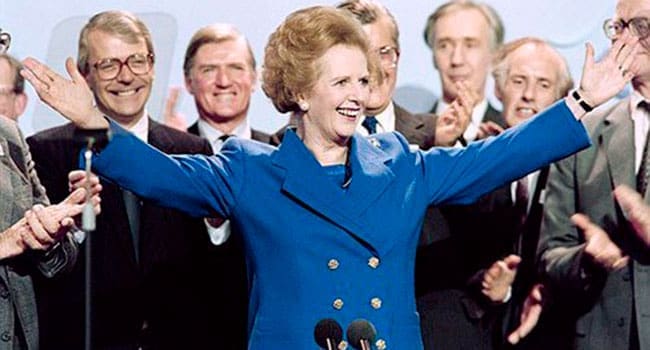 British Prime Minister Theresa May’s hapless performance in the recent United Kingdom election brought to mind another British prime minister’s voting travails.
British Prime Minister Theresa May’s hapless performance in the recent United Kingdom election brought to mind another British prime minister’s voting travails.
Although her ultimately decisive victory pushed the unpleasantness into the shadows, Margaret Thatcher – the Iron Lady, no less – had a serious wobble en route to winning a third consecutive mandate in 1987.
Charles Moore addresses this wobble in the second volume of his planned three-part Margaret Thatcher biography. And notwithstanding his fundamental sympathy for his subject, Moore’s portrait includes a fair share of warts.
As he sees it, the Conservative problems during the 1987 campaign were down to Thatcher herself. He puts it pungently: “It was the result of too many cooks spoiling the broth, and of the fact that, over the question of who should be head chef, Mrs Thatcher’s indecision was final.”
Much of this had to do with a fractious relationship between Thatcher and Conservative Central Office. Norman Tebbit, the party chairman, had been a key ally but she didn’t entirely trust him. He was, she suspected, after her job.
So she did what people often do when they don’t feel sufficiently secure to confront someone directly. She set up an arrangement of her own so that she could work around him. Hence the proliferation of cooks in the election management kitchen.
The political indicators leading up to the election were actually quite positive for the Tories.
Inflation had fallen dramatically, employment was growing and manufacturing productivity was improving at the fastest clip in the G7. Economically, the United Kingdom was no longer the “sick man of Europe.”
And whether you loved or loathed her, there was no gainsaying the fact that Thatcher had become a major figure on the world stage. Her late March 1987 visit to Moscow was generally regarded as a substantial success. Even the left-wing Guardian newspaper gave it a positive review.
The opinion polls were also propitious. For instance, a Sunday Times survey published on April 5, 1987, showed “the Conservatives 12 points ahead of the Alliance, with Labour now in third place.” (The Alliance was a centrist mixture of relative moderates who had broken off from Labour and the old Liberal party. It has been replaced by the Liberal Democrats.)
But once the vote was called for June 11 and the campaign got underway, the natural ebb and flow dynamic put Thatcher on edge. Elections weren’t something she ever took for granted. In Moore’s telling, they “made her intensely anxious.”
And Labour started to generate favourable coverage. There was a new, youngish leader – Neil Kinnock – and Chariots of Fire director Hugh Hudson put together a well-received Labour campaign film.
Combined with some perceived Thatcher missteps, this was enough to influence the horse race narrative. Labour was now on a mild upswing in the polls, regaining second place from the Alliance and Thatcher’s innate electoral nervousness moved into overdrive.
The panic came to a head just a week before the election.
Known as Wobbly Thursday, it all revolved around a Gallup poll showing the Tory lead down to four points, rumours of an impending poll that would further slash the lead to two points, and an abscessed Thatcher tooth.
Convinced that she was about to lose the election, Thatcher went off the deep end. Michael Dobbs – who worked at Conservative Central Office and subsequently created House of Cards – describes her private demeanour as “almost frothing.”
But as things transpired, the poll rumour was wrong. When it was published, the Tory lead was 10 points, not two. So the panic subsided.
On election day, the result caught most pundits by surprise. The BBC’s exit poll projected 338 Tory seats, just 12 more than required for an absolute majority. But on a 75 per cent turnout, they won 376. It was Thatcher’s third consecutive majority and her second landslide.
The dictum of history being written by the winners isn’t necessarily true, but it’s fair to say that outcomes have significant bearing on how people are retrospectively viewed.
Both Thatcher’s 1987 campaign and May’s in 2017 were seriously flawed, and both ended up with 42 per cent of the vote. But the fact that Thatcher won an overwhelming majority while May was reduced to minority status dramatically colours perceptions.
The Welsh politician Nye Bevan got it right: politics is a blood sport.
Troy Media columnist Pat Murphy casts a history buff’s eye at the goings-on in our world. Never cynical – well perhaps a little bit.
The views, opinions and positions expressed by columnists and contributors are the author’s alone. They do not inherently or expressly reflect the views, opinions and/or positions of our publication.

